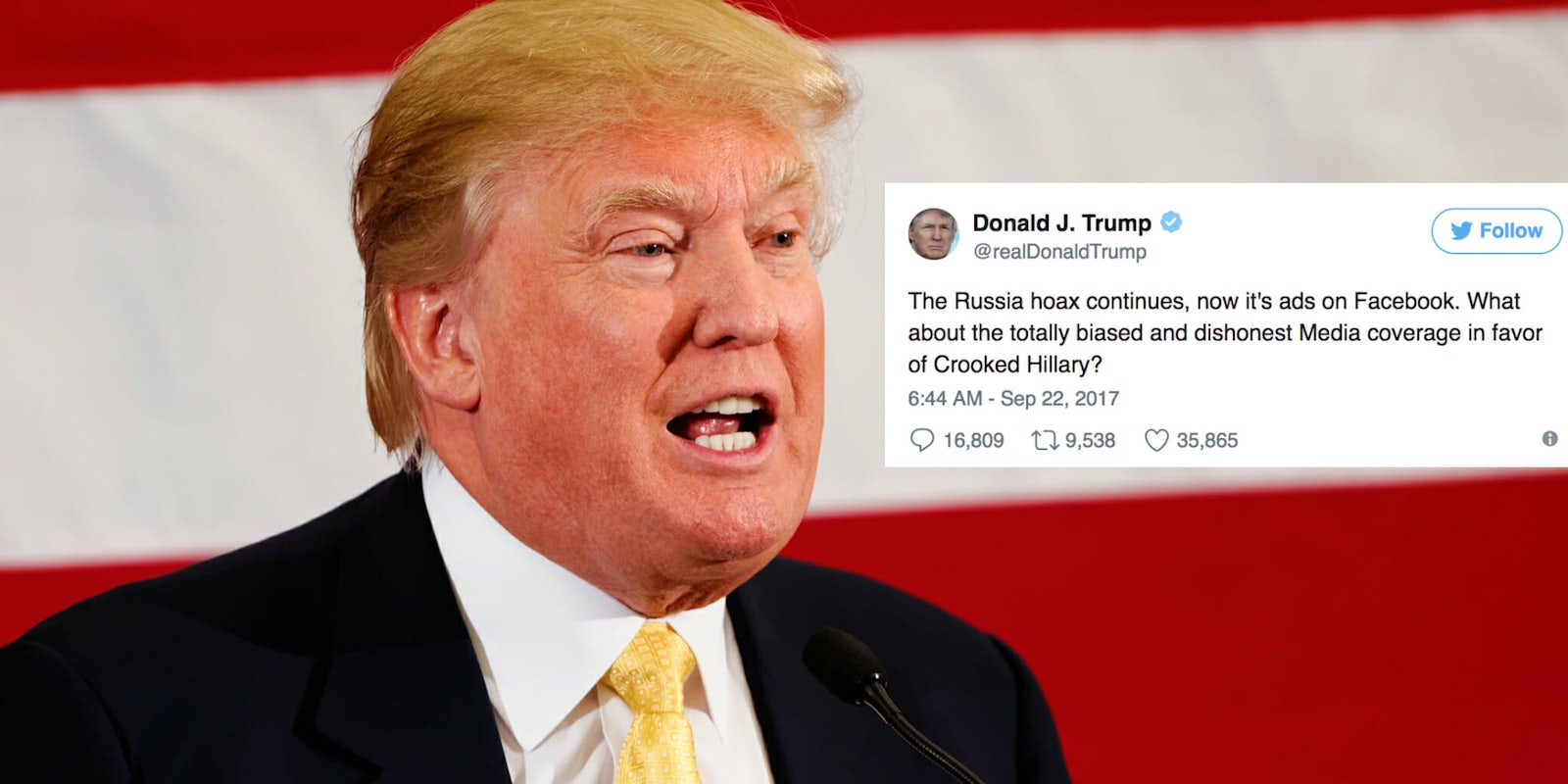President Donald Trump‘s latest attempt to defend himself against the ongoing probes into Russian election tampering fly in the face of basic facts.
On Friday morning, Trump responded to news that Facebook had turned over some 3,000 ads it believes are linked to Russian operatives by calling it a “hoax.”
The Russia hoax continues, now it’s ads on Facebook. What about the totally biased and dishonest Media coverage in favor of Crooked Hillary?
— Donald J. Trump (@realDonaldTrump) September 22, 2017
The greatest influence over our election was the Fake News Media “screaming” for Crooked Hillary Clinton. Next, she was a bad candidate!
— Donald J. Trump (@realDonaldTrump) September 22, 2017
While honest people can debate whether 2016 Democratic nominee Hillary Clinton was a bad candidate, there are a number of simply false statements in the president’s latest Twitter outburst.
Facebook did, in fact, discover ads purchased by Russians ahead of November’s election. The company turned over the ads to the House and Senate Intelligence Committees, both of which are conducting investigations into Russia’s attempts to influence the 2016 election. Facebook also turned over the ads to Robert Mueller, the special counsel running the Department of Justice investigation into Russian election tampering.
“We are actively working with the U.S. government on its ongoing investigations into Russian interference. We have been investigating this for many months, and for a while, we had found no evidence of fake accounts linked to Russia running ads,” Facebook CEO Mark Zuckerberg said in a statement on Thursday. “When we recently uncovered this activity, we provided that information to the special counsel. We also briefed Congress—and this morning I directed our team to provide the ads we’ve found to Congress as well.”
Now, what Trump likely meant by dubbing Facebook’s Russia-linked ads a “hoax” is that the ads did not determine the outcome of the election. At this point, there is no available evidence that they did. However, considering Facebook has 1.32 billion daily users as of June 17, millions of whom live in the U.S., it’s not impossible that at least some Americans’ votes were swayed by Russian activity on the social network.
That brings us to Trump’s second error: Media coverage of Clinton. Although American newsrooms are generally staffed with more liberals than conservatives, the media more heavily focused on the controversies surrounding Clinton’s use of a private email system during her time as secretary of state than on any of Trump’s various scandals, studies show.
As Thomas E. Patterson, author of a report from Harvard University’s Shorenstein Center on Media, Politics and Public Policy, told the Washington Post of his findings:
“Clinton’s controversies got more attention than Trump’s (19 percent versus 15 percent) and were more focused. Trump wallowed in a cascade of separate controversies. Clinton’s badgering had a laser-like focus. She was alleged to be scandal-prone. Clinton’s alleged scandals accounted for 16 percent of her coverage—four times the amount of press attention paid to Trump’s treatment of women and sixteen times the amount of news coverage given to Clinton’s most heavily covered policy position.”
A study from Harvard’s Berkman Klein Center for Internet & Society of more than 2 million articles published during the 2016 campaign found similar conclusions:
“The report found that the majority of mainstream media coverage was negative for both candidates, but largely followed Trump’s agenda. Immigration received more attention than any other substantive issue. However, it was eclipsed by the attention given to the scandals surrounding Hillary Clinton’s use of a private email server and the Clinton Foundation, which were perpetuated through the release of hacked emails. These two topics, immigration and emails, defined the public narrative around the choices for voters in the 2016 election.”
Trump did win the 2016 election. And Clinton may have been a bad candidate. But the president’s claims that Russian ads on Facebook are a hoax and the media favored Clinton are, to use one of Trump’s favorite terms, fake news.


